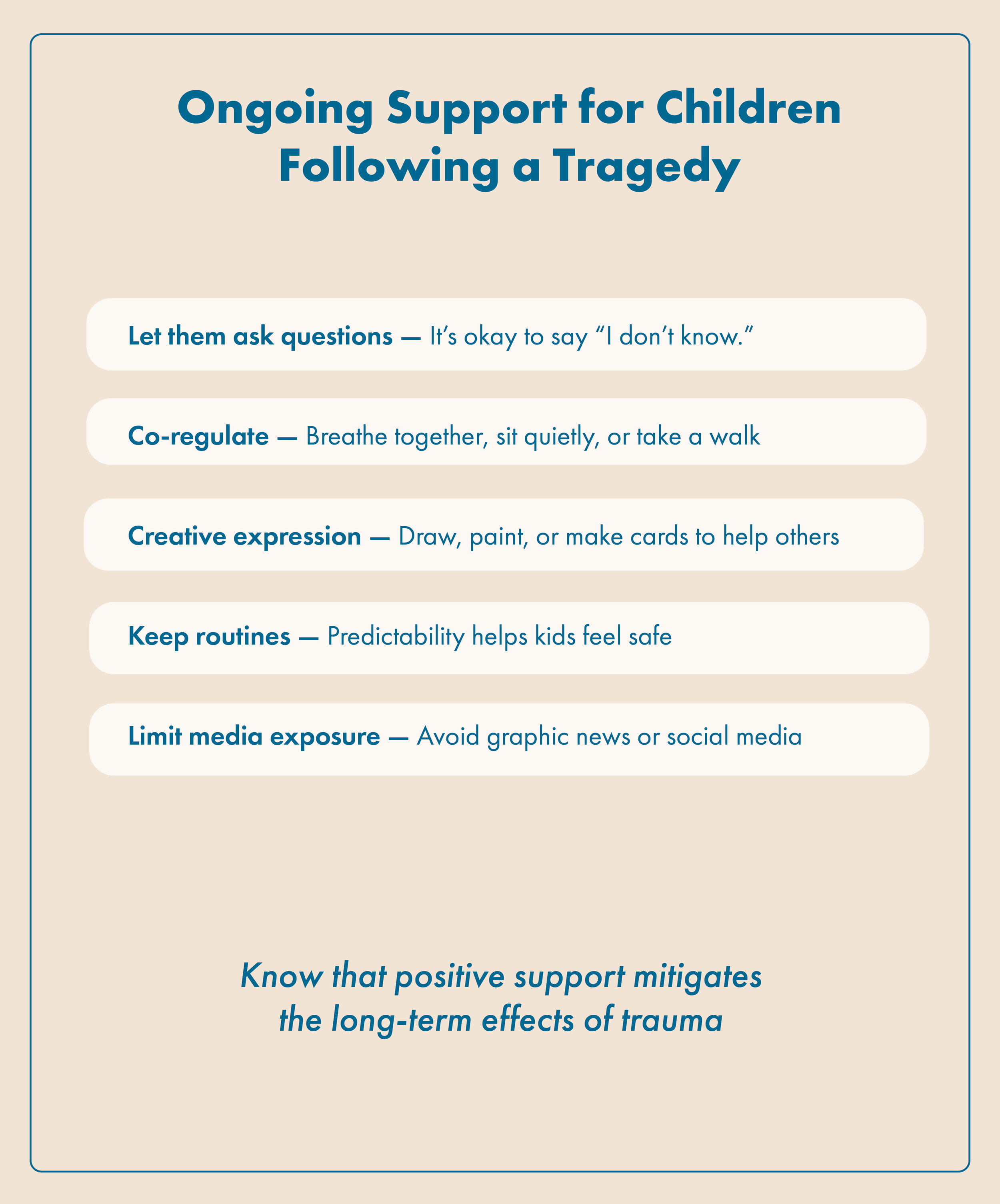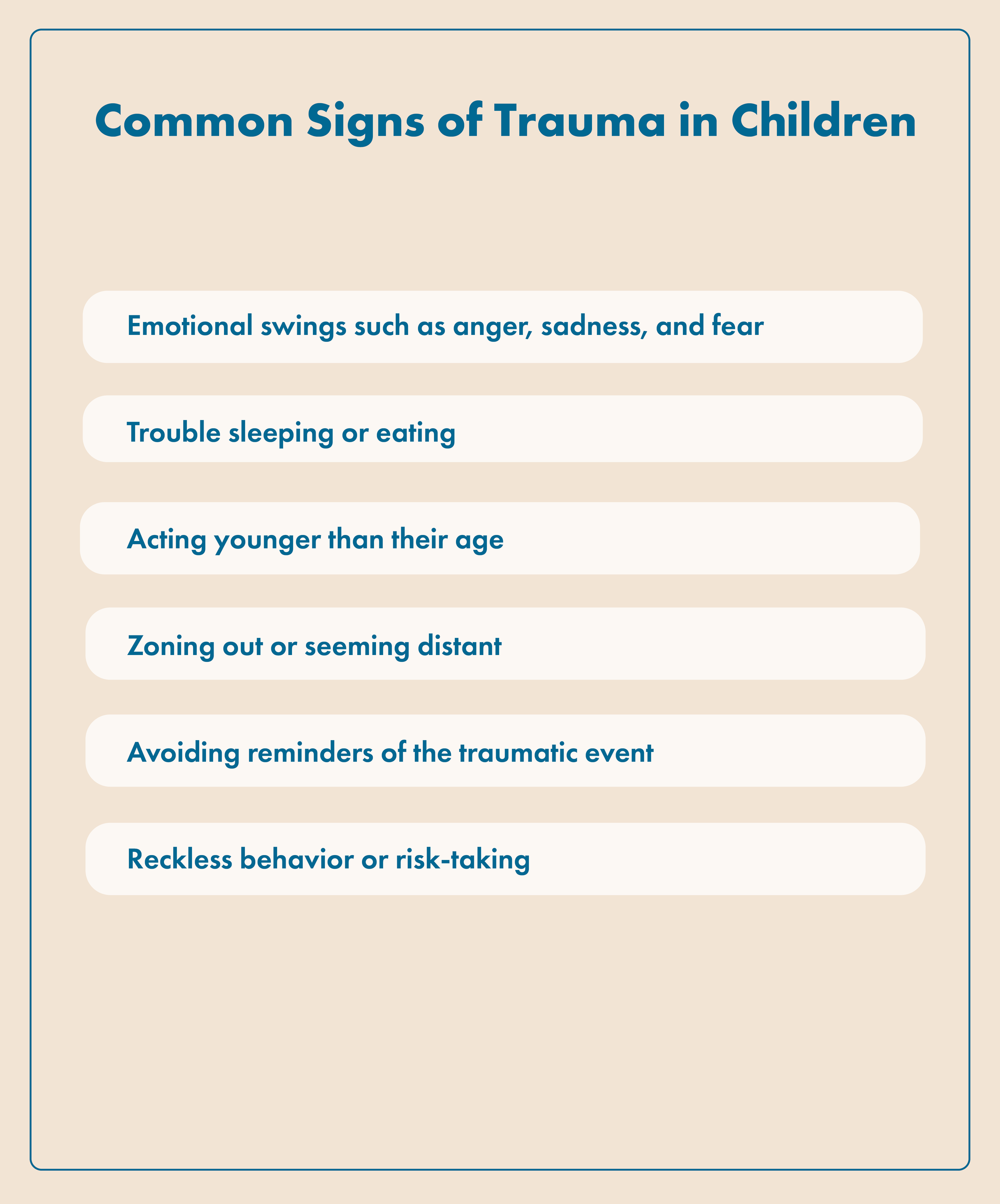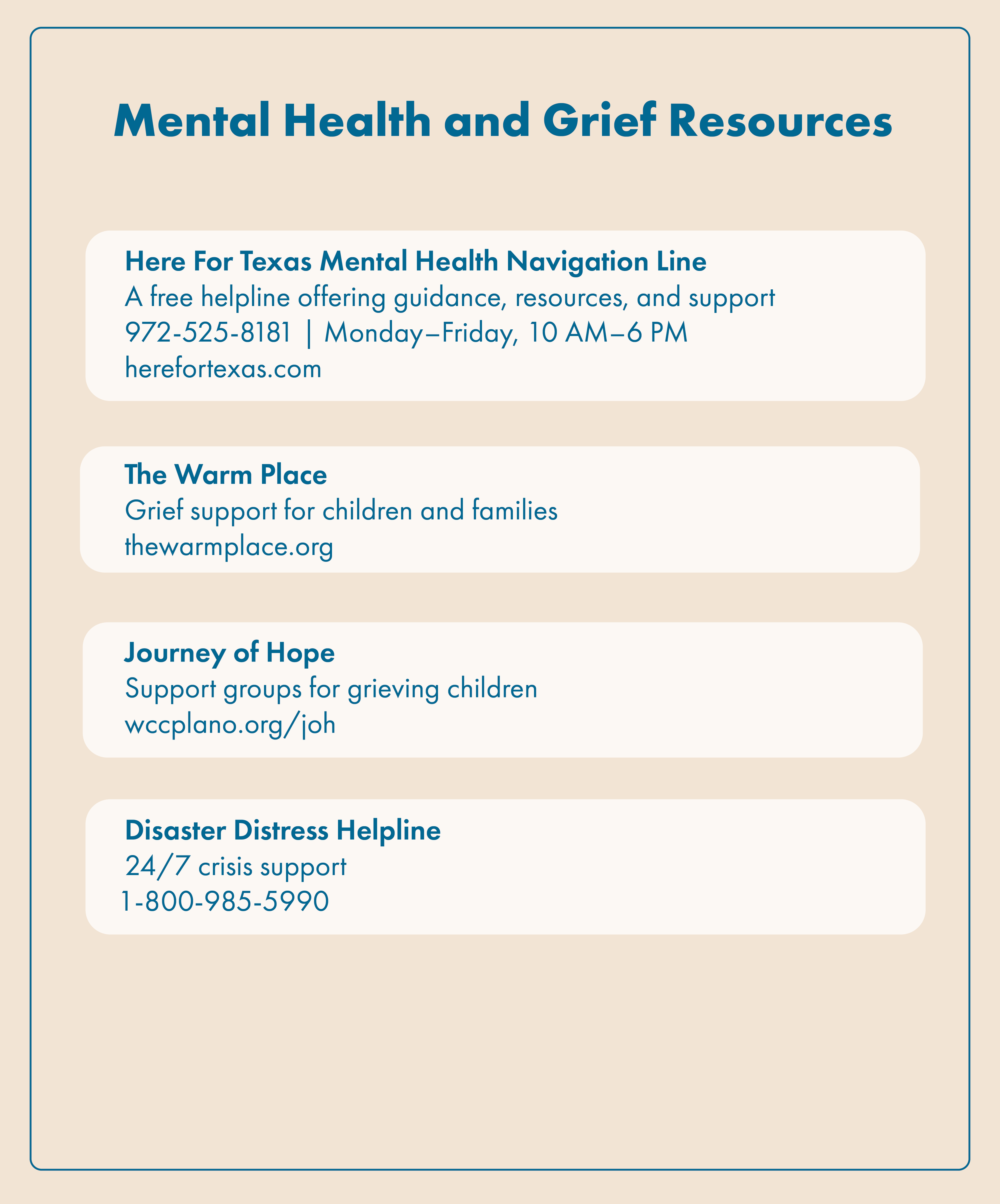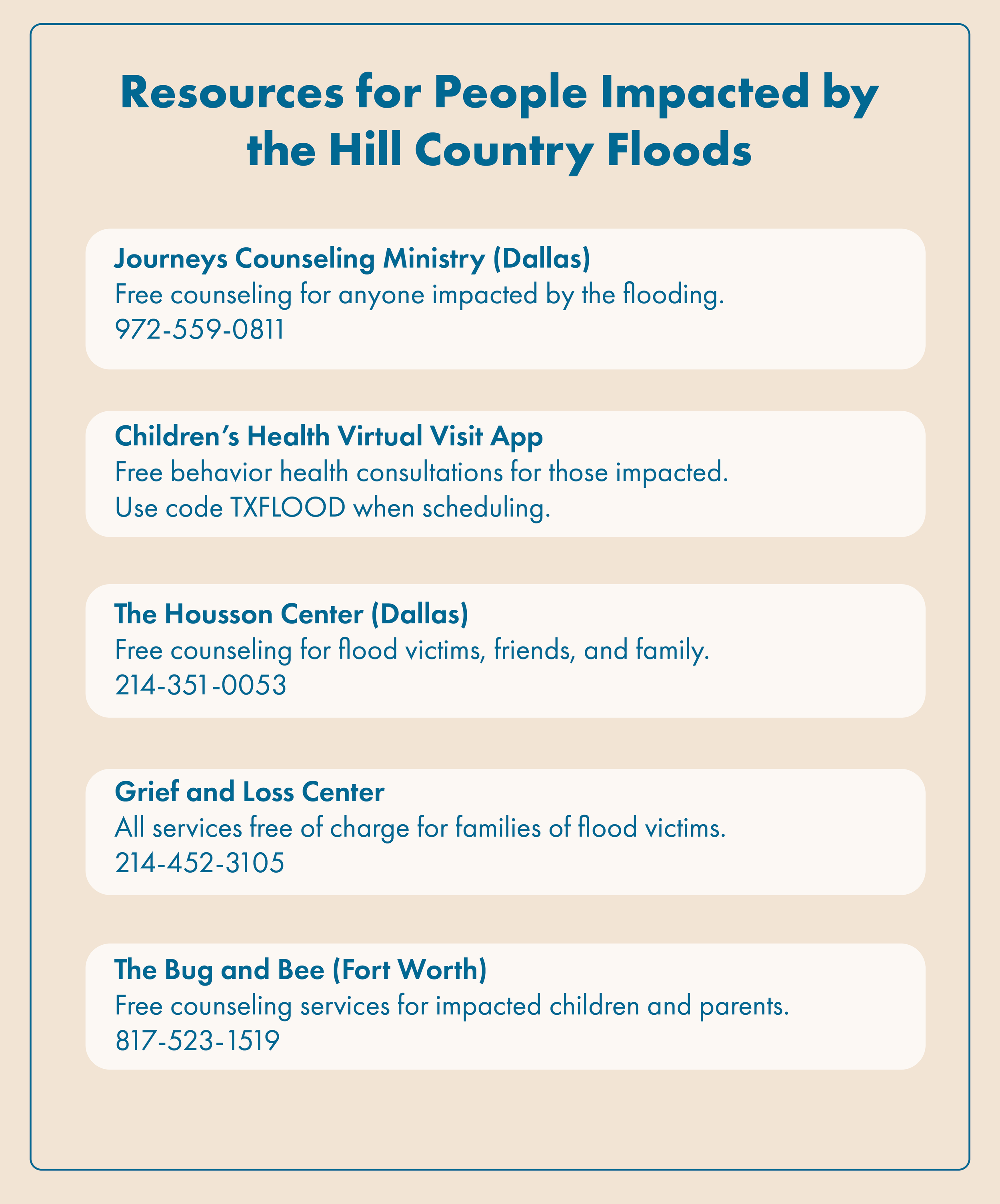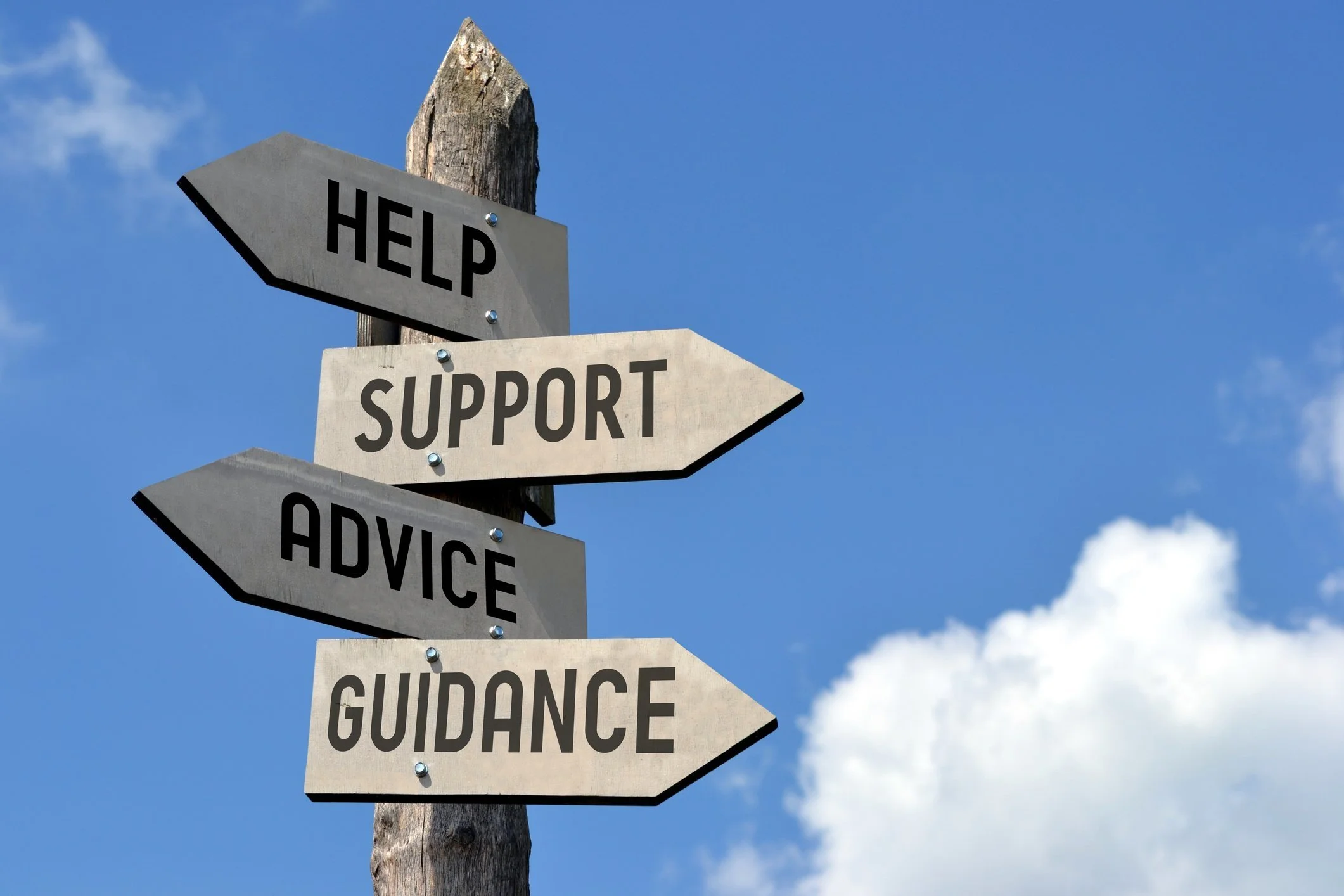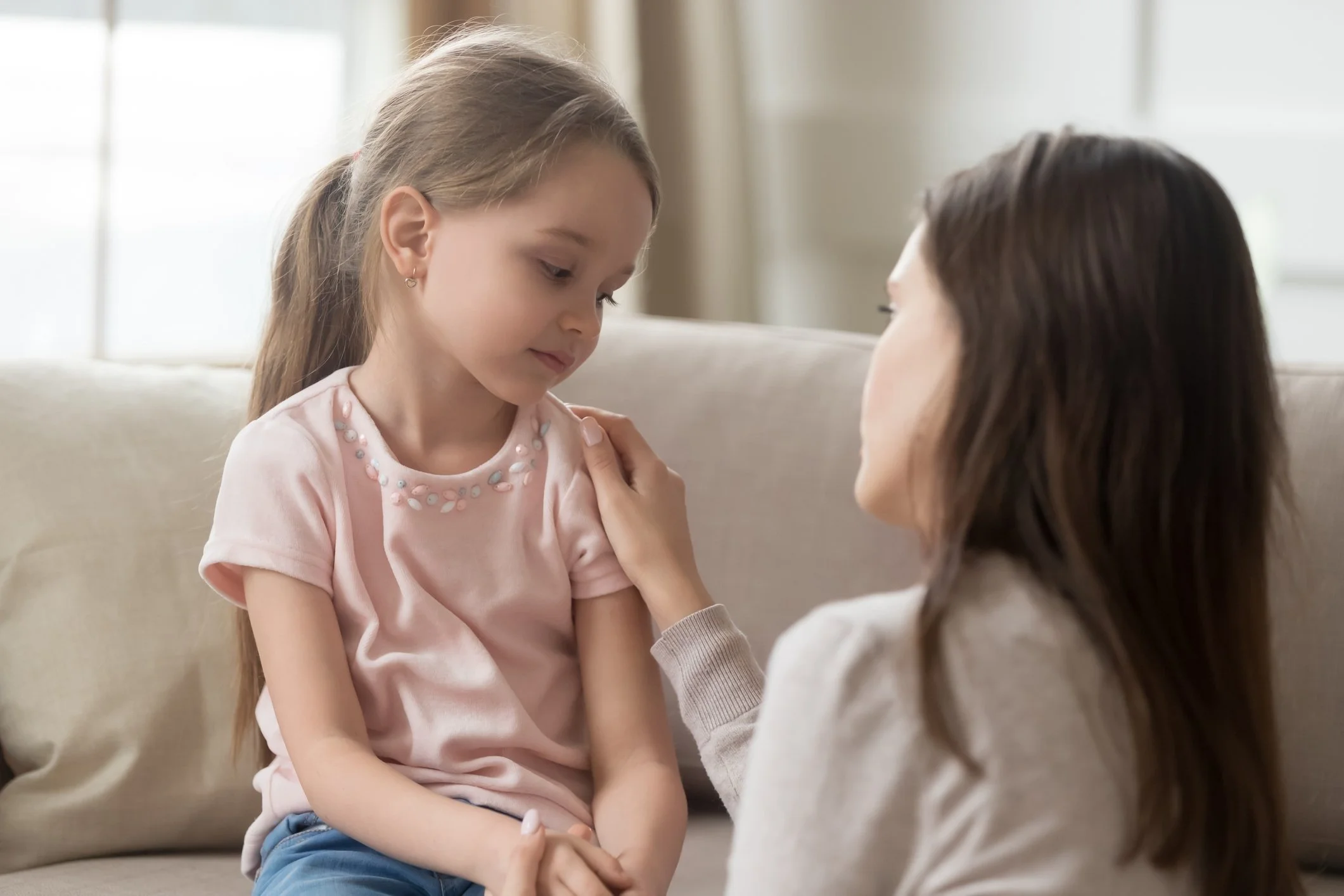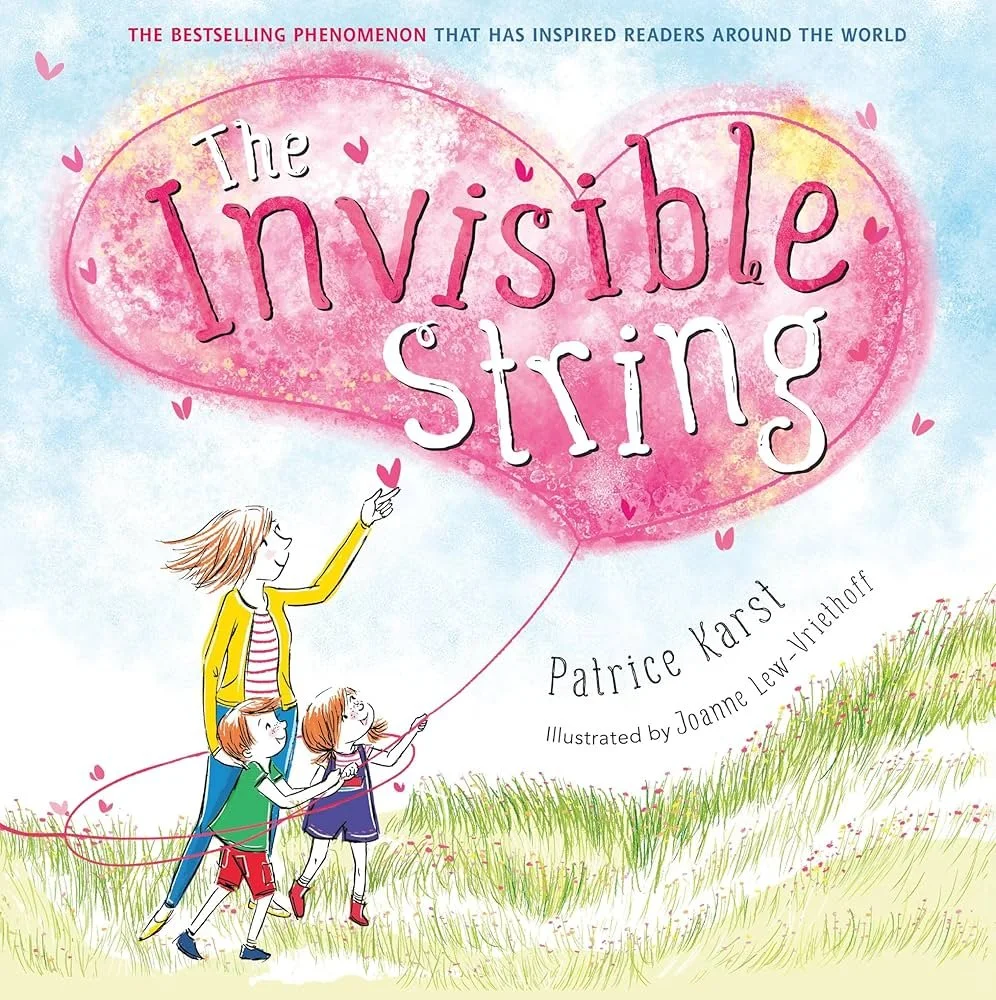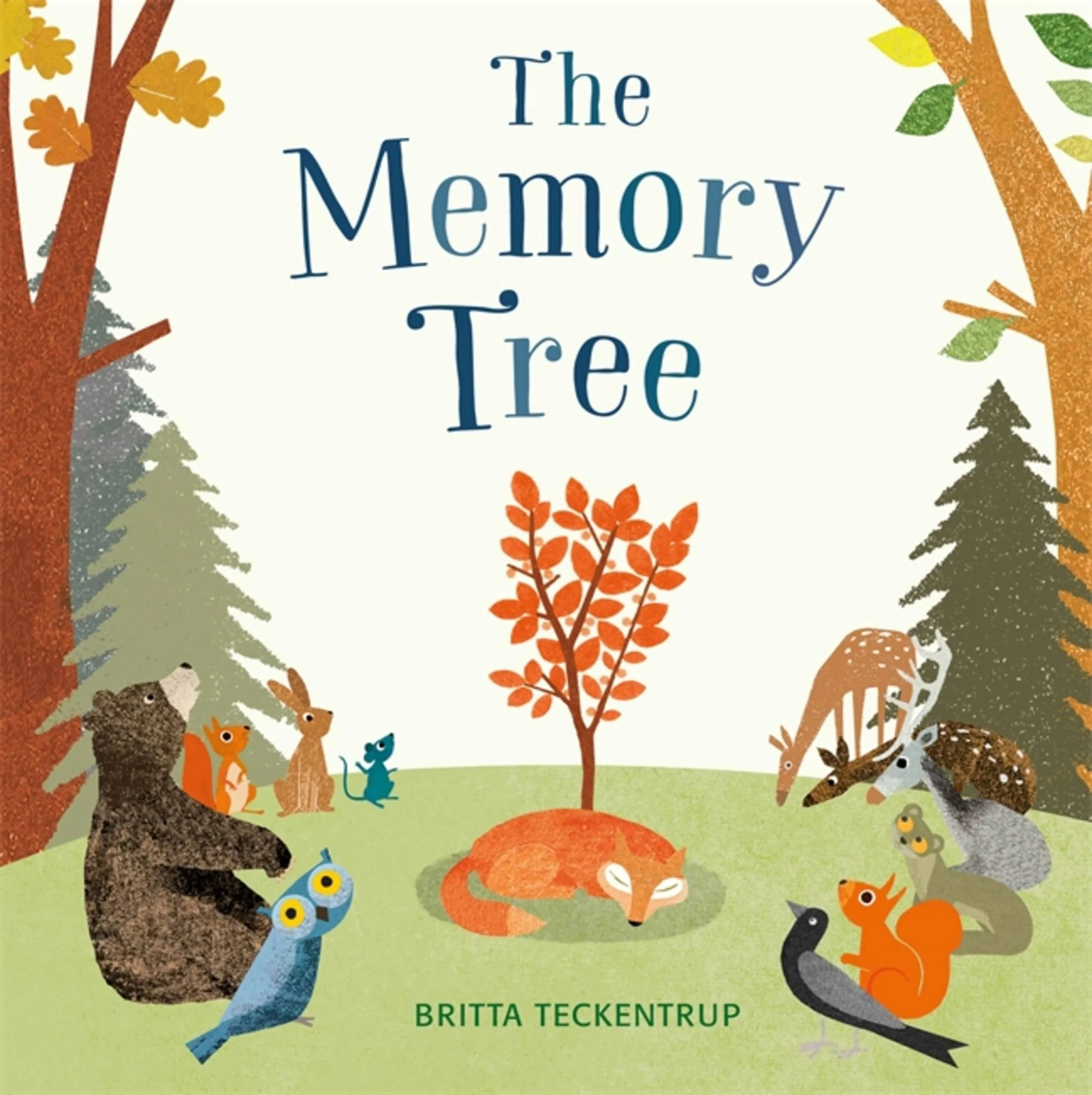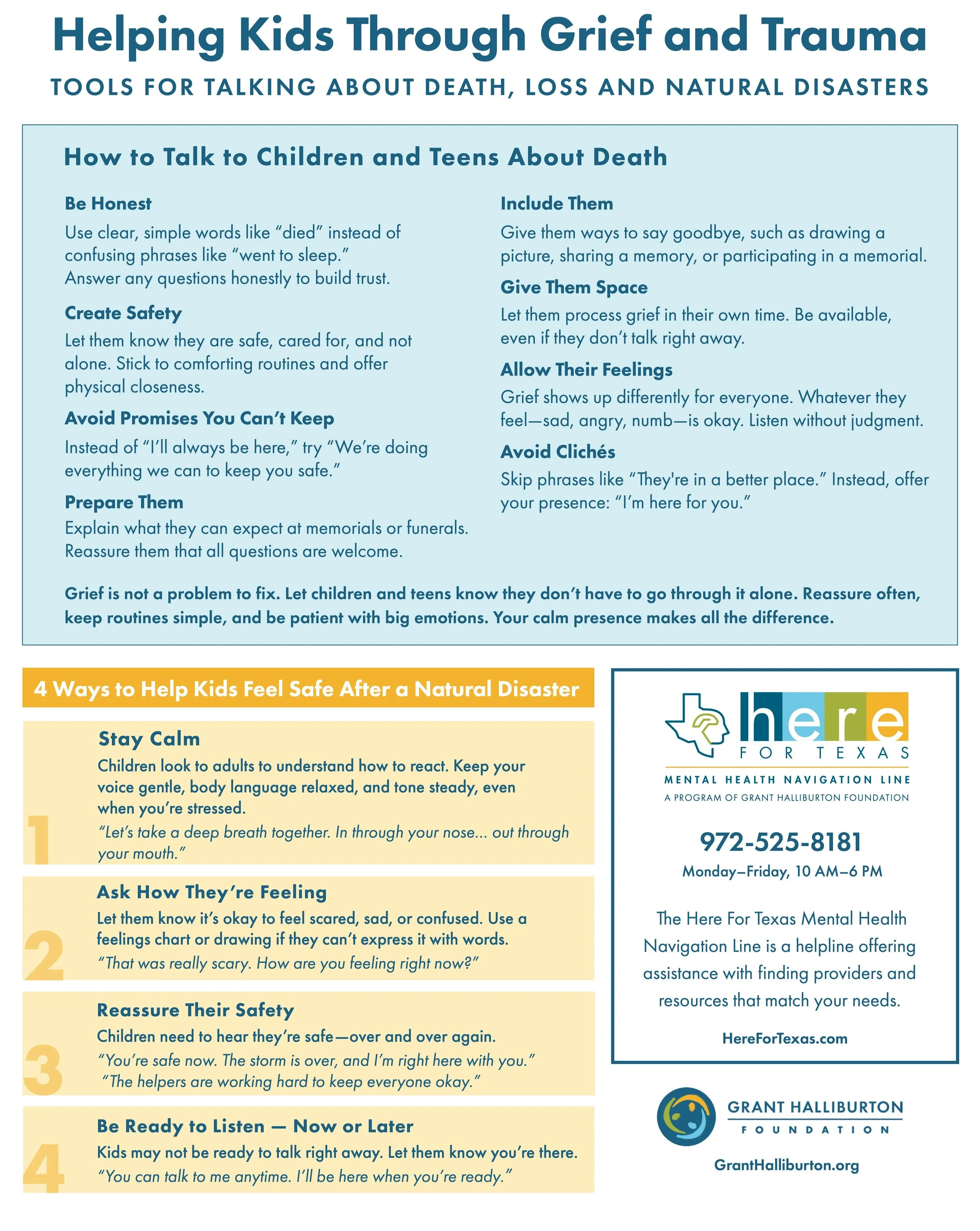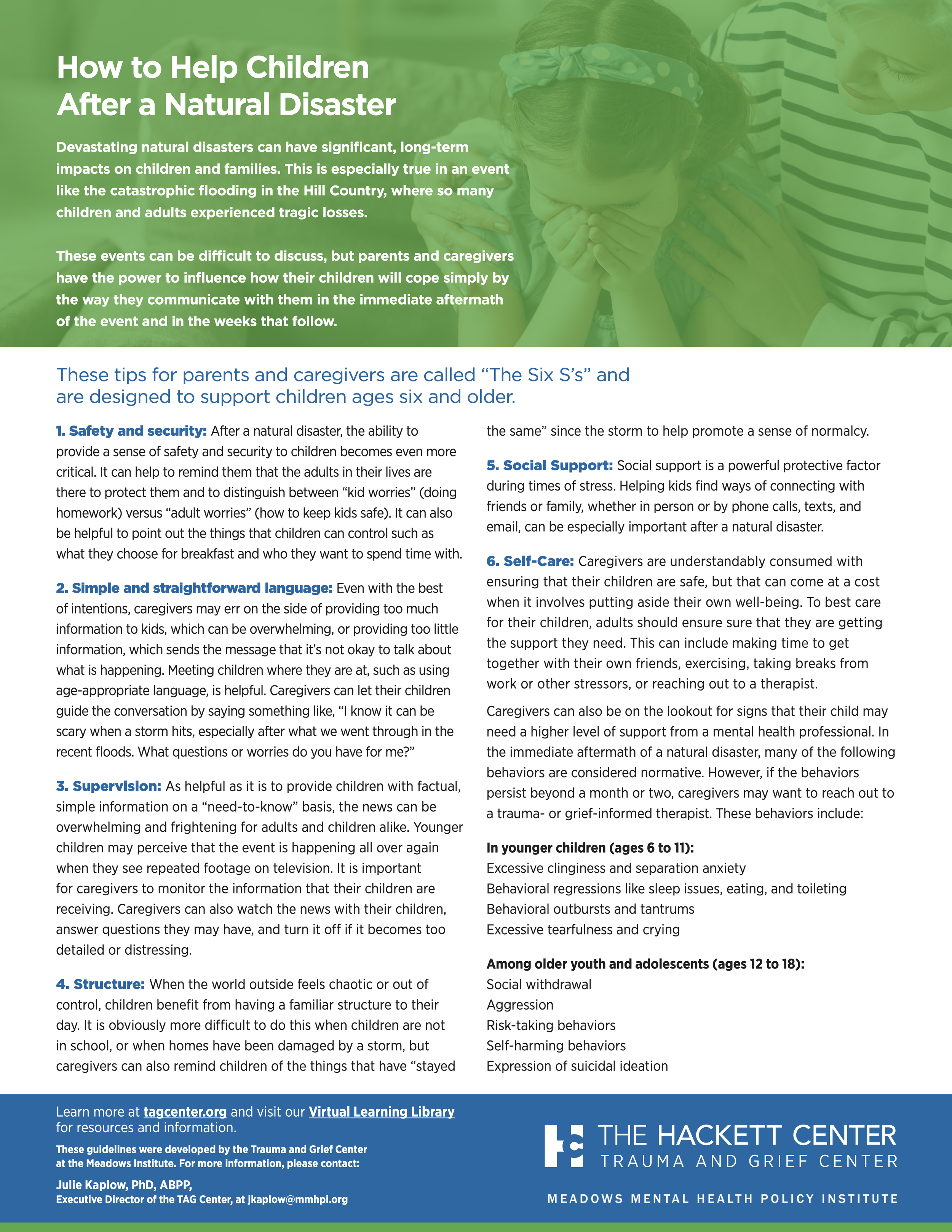Supporting Young People Through Trauma
When disasters or tragedies happen, the emotional impact on children and teens can be deep and long-lasting. Whether they’ve experienced the event directly or are affected by news coverage and conversations around them, young people need support to understand and process what they’re feeling.
At Grant Halliburton Foundation, we’re committed to helping families, caregivers, and educators respond with care and compassion. On this page, you’ll find tools, tips, and mental health resources designed to help youth cope with traumatic events and begin to heal.
Talking to Children After a Traumatic Event
-
Let them know they’re safe, loved, and not alone.
“I love you and you’re safe right now.”
“I’m here with you and I’m not going anywhere.”
“There’s nothing you can say or ask that would upset me.”
-
Name emotions and let them know it’s okay.
“It makes sense to feel scared or confused. That’s really normal after something like this.”
“I can only imagine how scary that would feel for you.”
-
Give them space to process at their pace.
“Do you want to talk more about it?”
“How are you feeling in your body today? Any tummy aches or trouble sleeping?”
-
Just listening is often the best support.
Avoid saying: “Don’t worry,” or “It’s going to be fine.”
Instead say: “Thank you for sharing that. I’m really proud of you for talking about it.”
-
“That’s a good question. I don’t know the answer right now, but I’ll try to find out.”
-
This helps clear up confusion or misinformation.
“What have you heard about the flooding?”
“Did you hear something from a friend or online?”
-
Use calm, age-appropriate language.
“There was a really bad storm that caused major flooding and some people died. There are also some people hurt or still missing. People are helping and doing their best to take care of everyone.”
How Adults Can Support Children Through Trauma
The way adults respond to a traumatic event can have a powerful impact on how children and adolescents cope and heal. When caregivers and family members take steps to manage their own stress and emotions, they are better equipped to support the young people in their lives.
Creating a calm, safe, and supportive environment is key. Children need reassurance that they are loved and that the adults around them are doing everything they can to keep them safe.
-
Make sure children are safe and their basic needs are met.
Allow them to feel sad or cry. It’s a healthy part of the grieving process.
Encourage them to express their feelings by talking, drawing, or writing.
Limit repeated exposure to traumatic news coverage or upsetting images.
Let them sleep in your room for a short time or use a nightlight if it helps them feel safe.
Stick to familiar routines, like reading bedtime stories, eating meals together, or playing games.
Offer choices to help them feel some sense of control, such as picking meals or clothes.
Watch for sudden changes in behavior, speech, or emotional responses.
Reach out to a mental health provider if symptoms persist longer than a few weeks, especially if they include:
Flashbacks or reliving the event
Difficulty sleeping, racing heart, or frequent startle responses
Emotional numbness or withdrawal
Ongoing sadness or signs of depression
-
Expect children to "be brave" or "tough it out."
Force them to talk about the event before they’re ready.
Get frustrated if they express strong or unexpected emotions.
Punish behaviors like bed-wetting, tantrums, or thumb-sucking as they may be temporary regressions.
Make promises you can't guarantee, such as saying, "Everything will be fine tomorrow."
Support for Children After a Traumatic Event
Mental Health Resources
Mental Health Navigation Line
The Here For Texas Mental Health Navigation Line makes it easier to find mental health resources that fit your needs. This free helpline assists callers in the search for information about mental health providers and resources. Callers are connected to a trained mental health navigator who can offer support and information about services in their area. Help is just a phone call away at 972.525.8181.
List of Texas Mental Health Providers
In the wake of the devastating floods impacting communities across Texas, this list was created to help families find real, immediate support. Every therapist listed here has confirmed they are currently accepting new clients and actively work with children and families navigating trauma. Each one is committed to offering steady, compassionate care during overwhelming times.
Podcast: Talking to Your Kids About Loss and Trauma
Steve Noviello and Jenny Anchondo host a heartfelt conversation with two specially trained trauma specialists. Like so many parents and caregivers, they’re grappling with how to talk to their own children about the unimaginable loss of life—young and old—following last week’s devastating flood in Kerr County.
Storybooks to Help Talk About Loss
The Invisible String by Patrice Karst
A comforting story that reassures children that love keeps us connected, even when someone we love is no longer physically present. (Ages 4 – 10)
The Memory Tree by Britta Teckentrup
A gentle and heartfelt story for children about loss, remembrance, and the power of keeping memories alive through love and community. (Ages 4 – 8)
Resources to Print
Helping Kids Through Grief and Trauma
This downloadable guide offers practical tips to help parents, caregivers, and educators support children through grief and trauma. It includes clear, compassionate guidance on how to talk with kids, recognize signs of emotional distress, and create space for healing.
How to Help Children After a Natural Disaster
This downloadable guide offers practical tools to help parents and caregivers support children after a natural disaster. This resource provides clear, compassionate guidance on how to talk with children about what happened, recognize signs of trauma, and offer comfort and stability.


